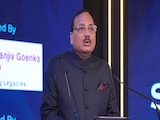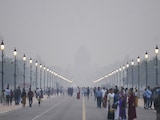About 10 parents every year in Phoenix lose their children by leaving them in hot cars (Representational)
Every year in the Phoenix area, fire officials say, roughly 10 parents come to the stomach-clenching conclusion that they've made a fatal mistake and left a small child in a sweltering car.
Last week, with temperatures regularly topping 100 degrees, it happened twice in a 24-hour period.
Both deaths - a 1-year-old found dead in a church parking lot on Saturday and a 7-month-old who died while being cared for by his grandparents the day before - are under investigation. Both are believed to be accidental.
The deaths were the first and second cases of a child dying of heat stroke in a sweltering car this year, Sgt. Mercedes Fortune told The Washington Post. The city is in what is called the monsoon season, when temperatures and humidity are at their highest points. Public officials sound "a steady drumbeat" of warnings about hydration, hiking and leaving pets and children unattended, she said.
The high temperature in Phoenix was 103 degrees on Saturday, according to the National Weather Service. It was 101 degrees the day before.
On Friday, 7-month-old Zane Endress died after he had been left in the northeast part of the city for four hours, Fortune said.
"How could this happen to good people and a good boy," the child's aunt, Michelle Anderson, told the Arizona Republic as she wiped away tears. "He never cried and was so happy."
Photos from the scene showed police cars parked in a suburban neighborhood.
A day later, at the Free Church of God in Christ near 27th Street, a father returned to his car and realized that his 1-year-old son was still inside.
Police later identified the baby as Josiah Riggins. Fire officials pronounced the child dead at the scene.
The father had apparently left the child unattended for at least two hours at the family's home in nearby Mesa before driving to the church, Fortune said. Investigators believe Josiah died there, so that city's police department is taking over the investigation.
The child's father has not been arrested. He was cooperating with investigators, who will ultimately present their evidence to the Maricopa District Attorney's office, to determine if the man committed a crime.
Since 1998, 729 children left in vehicles have died of heatstroke, according to NoHeatStroke.org, an organization that tracks the deaths of children in hot vehicles.
Arizona has one of the nation's worst rates of children dying in hot cars at, 18.1 per 1 million people, according to the organization's database.
The Phoenix area sees about 10 hot car child deaths a year, Phoenix Fire Capt. Larry Subervi told NBC News.
According to NoHeatStroke.org's research, the ambient temperature of a car can reach 19 degrees above the ambient temperature in less than 10 minutes, and nearly 30 degrees hotter than air temperature in 20 minutes.
Last year, the organization recorded 29 heatstroke deaths of children left in cars. Since 1998, the United States has averaged 37 heatstroke fatalities.
Families can suffer with the emotional scars of such deaths for a lifetime. And the justice system must sort out whether the parent's actions fell on the wrong side of the law.
As The Washington Post's Gene Weingarten wrote in 2009:
"There may be no act of human failing that more fundamentally challenges our society's views about crime, punishment, justice and mercy. According to statistics compiled by a national child's' safety advocacy group, in about 40 percent of cases authorities examine the evidence, determine that the child's death was a terrible accident - a mistake of memory that delivers a lifelong sentence of guilt far greater than any a judge or jury could mete out - and file no charges. In the other 60 percent of the cases, parsing essentially identical facts and applying them to essentially identical laws, authorities decide that the negligence was so great and the injury so grievous that it must be called a felony, and it must be aggressively pursued."
Fortune said that as the season with the most child hyperthermia deaths continues, parents should take more time to make sure their children are safe.
"We hear that parents are saying they forgot their babies in their vehicles," she told the Republic. "Take some time, again, to look inside your vehicle . . . to just avoid these tragedies."
(This story has not been edited by NDTV staff and is auto-generated from a syndicated feed.)
Last week, with temperatures regularly topping 100 degrees, it happened twice in a 24-hour period.
Both deaths - a 1-year-old found dead in a church parking lot on Saturday and a 7-month-old who died while being cared for by his grandparents the day before - are under investigation. Both are believed to be accidental.
The deaths were the first and second cases of a child dying of heat stroke in a sweltering car this year, Sgt. Mercedes Fortune told The Washington Post. The city is in what is called the monsoon season, when temperatures and humidity are at their highest points. Public officials sound "a steady drumbeat" of warnings about hydration, hiking and leaving pets and children unattended, she said.
The high temperature in Phoenix was 103 degrees on Saturday, according to the National Weather Service. It was 101 degrees the day before.
On Friday, 7-month-old Zane Endress died after he had been left in the northeast part of the city for four hours, Fortune said.
"How could this happen to good people and a good boy," the child's aunt, Michelle Anderson, told the Arizona Republic as she wiped away tears. "He never cried and was so happy."
Photos from the scene showed police cars parked in a suburban neighborhood.
A day later, at the Free Church of God in Christ near 27th Street, a father returned to his car and realized that his 1-year-old son was still inside.
Police later identified the baby as Josiah Riggins. Fire officials pronounced the child dead at the scene.
The father had apparently left the child unattended for at least two hours at the family's home in nearby Mesa before driving to the church, Fortune said. Investigators believe Josiah died there, so that city's police department is taking over the investigation.
The child's father has not been arrested. He was cooperating with investigators, who will ultimately present their evidence to the Maricopa District Attorney's office, to determine if the man committed a crime.
Since 1998, 729 children left in vehicles have died of heatstroke, according to NoHeatStroke.org, an organization that tracks the deaths of children in hot vehicles.
Arizona has one of the nation's worst rates of children dying in hot cars at, 18.1 per 1 million people, according to the organization's database.
The Phoenix area sees about 10 hot car child deaths a year, Phoenix Fire Capt. Larry Subervi told NBC News.
According to NoHeatStroke.org's research, the ambient temperature of a car can reach 19 degrees above the ambient temperature in less than 10 minutes, and nearly 30 degrees hotter than air temperature in 20 minutes.
Last year, the organization recorded 29 heatstroke deaths of children left in cars. Since 1998, the United States has averaged 37 heatstroke fatalities.
Families can suffer with the emotional scars of such deaths for a lifetime. And the justice system must sort out whether the parent's actions fell on the wrong side of the law.
As The Washington Post's Gene Weingarten wrote in 2009:
"There may be no act of human failing that more fundamentally challenges our society's views about crime, punishment, justice and mercy. According to statistics compiled by a national child's' safety advocacy group, in about 40 percent of cases authorities examine the evidence, determine that the child's death was a terrible accident - a mistake of memory that delivers a lifelong sentence of guilt far greater than any a judge or jury could mete out - and file no charges. In the other 60 percent of the cases, parsing essentially identical facts and applying them to essentially identical laws, authorities decide that the negligence was so great and the injury so grievous that it must be called a felony, and it must be aggressively pursued."
Fortune said that as the season with the most child hyperthermia deaths continues, parents should take more time to make sure their children are safe.
"We hear that parents are saying they forgot their babies in their vehicles," she told the Republic. "Take some time, again, to look inside your vehicle . . . to just avoid these tragedies."
(This story has not been edited by NDTV staff and is auto-generated from a syndicated feed.)















